- Home
- Jane Arbor
Queen's Nurse Page 4
Queen's Nurse Read online
Page 4
“They do happen,” Muir reminded her dryly.
“I know, but one never expects them to,” returned Liane sagely. “Anyhow, what do you think of her? Did you suppose she was going to be as pretty or as young as that?”
“I knew she would be about the age she looks—twenty-four or so. I confess I hadn’t considered her probable looks.”
“But you do think she’s pretty, don’t you? I mean—the way her hair curls up to meet that perky uniform hat, and she’s sort of fresh looking and she’s got a charming smile—oh, but did you say she’s got a fiancé? Does that mean she won’t be here long after all?”
“She didn’t take me so far into her confidence, I’m afraid.”
“Well, I hope she’ll stay. I like her. I’d like her to be my friend. Do you mind, Muir—I asked her to stay and have coffee with me on Thursday?”
He turned to smile at her. “Of course I don’t mind. You don’t need to refer such things to me, Liane, When you do, it makes me feel that you still don’t regard Quintains as your home.”
Liane’s lips quivered. “I—I’m trying to,” she said. “But everything is still so strange in England that it’s not quite the same as home to me yet. Don’t think me ungrateful, will you, Muir?”
“That’s another thing—there’s no need to make an issue of gratitude between us.” His tone was more brusque, as if he were hurt or annoyed.
“But I am grateful. You—you’ve been wonderful to me.”
He glanced at her with a brief, meaning look. “Well, you know why, don’t you? You should also know by now what you can always expect from me.”
Emotion welled up in her, bringing the impulsive tears to her eyes. “Oh Muir, you are good to me. And—and such a dear!”
He was making ready to take the sharp turn in at the gates of the golf club. He swung the steering wheel almost full circle. “Not good,” he said. “Just being willing to stand by, waiting until you find your feet and really know what you want.”
When they alighted his hand was lightly and companionably beneath her elbow as they entered the clubhouse together. Liane was thinking that there was no need to go in awe of him as she sometimes did. His selfless concern for her, the thoughtful solicitude that had tempered the worst of her tragedy, his refusal to accept mere gratitude from her in return—these things began to make a sum, a pattern in her mind.
Muir was in love with her but was willing to wait to know that she loved him in return.
Did she love him? A little shiver ran through her as she wondered.
Mrs. Tempton-Burney, Jess’s convalescent appendix, lived in a small, inconvenient bungalow just off Cranemouth’s front. Its ugliness was redeemed, however, by a large garden, which ran down to the shore and which was tended solely by Mrs. Tempton-Burney’s eighteen-year-old daughter Petronella, for whom, as Jess had realized at their first meeting, all living things held a perpetual delight.
She kept hens very profitably and bred dogs in a small way, and had tended and fattened a series of pigs until, as she confided in Jess, mommy had said the pig food cost too much and hadn’t allowed her to have any more.
She was the sunniest, most equable person for her age whom Jess had ever met. In that she differed entirely from her mother, who was querulously self-pitying and most anxious that no one should suppose she had always been in the circumstances in which she now found herself. Mrs. Tempton-Burney, in fact, measured the whole of her present fate by the “better days” she had once known—and found it sadly wanting.
As Jess drew up in her car, Petronella (“Petra for short, please!” she had begged Jess) came to meet her, carrying a hen with its foot bandaged.
“Hello—another patient for me?” laughed Jess.
“No. I’ve just treated her. She has bumblefoot—an abscess that had to be cut. I’ve operated, and now she’s going to be isolated until the place heals.”
Jess looked her surprise. “Is it worthwhile to doctor hens? I thought you just cut your losses and popped them in the pot.”
“Not if they’re pullets, as this girl is. She’s got lots of laying potentiality yet, if I can cure her. And minor operations are perfectly simple, so long as you keep your instruments quite aseptic,” Petra said seriously before adding, “Hark at me telling you about clean instruments! Look, if you’ll just wait a moment while I put this creature in her coop, I’ll take you into mommy. She is waiting for you.”
“How is Mrs. Tempton-Burney?” asked Jess.
Petra sighed. “Better really, I think. But I do wish I could get some of the things for her she misses so much!”
“Such as?” queried Jess.
Petra considered the question. “I don’t quite know,” she admitted. “But she says that whenever she was ill in the old days, everything was quite different. Maids and people to bring her things, I suppose.”
“Very few people have maids nowadays,” remarked Jess.
“I know, but mommy seems to think that if only we had just a little more money we could keep at least two. And yet if she’d only let me do what I want to do, in time I might be keeping her and two maids as well! But I suppose she can’t afford it really.”
“Why, what do you want to do, Petra?”
“Oh, to be a veterinary surgeon! Last year at school I worked and worked to get my matric, because I thought we might manage it somehow by the time I could enter the Royal Veterinary College. But mommy can’t consider it, even if I could get a scholarship, so I’ve just had to forget it and make do with—with looking after hens and puppies, though once or twice I’ve managed to rescue an oil-soaked wild bird on The Warrens. You can’t think how satisfying that was!”
“Poor Petra! Is your ambition quite impossible?”
“I’m afraid so.” Petra brooded in silence for a minute, then squared her shoulders and smiled once more. “Anyway, I’m not worrying mommy about it again, and who knows, I may breed a litter of puppies that will be worth hundreds of guineas! Then I shall be all right, won’t I?” She showed Jess into Mrs. Tempton-Burney’s room and then went away, saying she would get some coffee for them all while Jess renewed her mother’s dressing and gave her a blanket bath.
Mrs. Tempton-Burney greeted Jess languidly and said that she felt very little better, if any. But while Jess worked she was moved to talk about Petra instead of herself.
“If only the child would do something for her looks!” she complained. “Those awful jeans she wears! And the way she does her hair—tied up in a kind of ponytail behind! She destroys her whole chance that a man would ever look at her, let alone give her a second glance!”
“Do you know, I thought she looked charming this morning?” protested Jess. “And quite suitably dressed for her work.”
“But she could make more of herself if she would,” persisted her mother. “Of course, if things had been as they once were with me, she would have gone to a finishing school, as I did. And afterward she would have had at least one London season—more if she needed it, which I hope she wouldn’t. Not—” an impressive pause “—but that I haven’t enough influence in the right places for her to have a season now, if only she would exert herself to be anything other than the hobbledehoy she is!”
More than one telling retort flashed through Jess’s brain in Petra’s defense, but she only asked quietly, “Wouldn’t a London season cost a great deal?”
Mrs. Tempton-Burney pursed her lips. “More than enough,” she admitted. “But it might be manned, and if she married at the end of it, it would be well worth it. Instead of which, what does she want—to be a veterinary surgeon, of all things! Naturally, I won’t hear of it!”
(Of course you won’t, thought Jess indignantly. You'd rather curb her natural talents to the point where, if she weren't the sunny optimist she is, she would either leave you and go and work out her own fate, or she would turn embittered through a frustration that you need not inflict upon her.) For Jess’s observation of Mrs. Tempton-Burney’s range of cosmetics and expensive negligées made
her wonder whether, with a little sacrifice, she could not afford to give Petra at least the start she wanted, and there must be scholarships that would help.
But Mrs. Tempton-Burney “wouldn’t hear of it”—so that seemed to be that.
When Petra appeared with the coffee tray she announced that there was a visitor for her mother, deferring to Jess’s permission to bring her in.
“Yes, do,” urged Jess. “Mrs. Tempton-Burney may have any visitors she pleases now, Dr. Gilder says.”
“I’ll fetch her then. It’s Mrs. Bretton, the wife of Mr. Forester’s estate agent.” To her mother Petra added, “I told her Nurse Mawney was with you, and she said she had heard she’s arrived and that she was looking forward to meeting her.”
But when Petra showed in Mrs. Bretton, Jess was to wonder just what the conventional social phrase had really meant. Certainly it implied no friendly eagerness to get to know her, for when the newcomer had pecked Mrs. Tempton-Burney on the cheek she subjected Jess to the coldest of stares as she sat down and removed her gloves.
She was a woman of thirty or so, with a long, narrow face and close-set eyes. Her clothes were rather studiedly “country” and her makeup was careful and well matched, though Jess noticed that her lipstick had been used over-generously to conceal the thin, almost cruel line of her mouth.
Jess sat in the window seat, sipping Petra’s excellent coffee and at first feeling more amused than annoyed by a disapproval of herself for which there seemed no obvious explanation. For a time she was pointedly ignored, except by Petra.
When Mrs. Bretton did address her she insinuated silkily, “How nice for you, nurse, to be able to find time for a chat and coffee with your patients! But I daresay you don’t find yourself exactly overburdened with cases yet?”
Jess stirred her coffee with deliberation before she replied. “No, I’m not very busy,” she admitted. “In fact, Dr. Gilder declares that my district has welcomed me by showing its cleanest bill of health for years.”
“And you don’t see anything significant in that, nurse?”
“No—why should I?”
Mrs. Bretton stirred her own coffee with some care. “Doesn’t it indicate that there might be a feeling in the villages about you, resulting in a caution in calling you in? I think you may find that a great many people here would have preferred an older woman or at least someone with more experience than you have. I understand you have come here straight from your training?”
As if she were anxious to range herself on Mrs. Bretton’s side, Mrs. Tempton-Burney murmured, “Well, Dr. Gilder called Nurse Mawney in without consulting me. I had no choice.”
Jess bristled with a hostility she found it hard to conceal. But she forced herself to reply calmly, “Do you know, I think the number of my cases will always be dependent on the number Dr. Gilder recommends me to attend—and on nothing else at all?”
Mrs. Bretton shrugged. “Oh, I know Dr. Gilder has full powers over you, nurse. But people may still refuse your services if they wish, may they not? For instance, I have reason to know that Mr. Forester up at Quintains would rather you didn’t attend his housekeeper, Mrs. Seacombe.”
It was Jess’s moment of triumph.
But it was snatched from her by Petra’s eager squeak, “But Nurse Mawney has just come from Quintains—from seeing Mrs. Seacombe only this morning!”
Mrs. Bretton’s eyes seemed to draw yet more closely inward. “Then I was misinformed—or Mr. Forester must have changed his mind,” she commented icily.
“Mrs. Seacombe happens to be Dr. Gilder’s patient,” murmured Jess. “Mr. Forester’s interest could only have been his friendly concern for her, and he would hardly have gone against her doctor’s advice, would he?”
Mrs. Bretton ignored the question. She turned pointedly toward Mrs. Tempton-Burney, and though Jess had meant to leave she decided to stay just long enough to indicate that, though she might have made an implacable enemy, she was not accepting defeat.
On her first visit she had understood from Petra that the Tempton-Burneys did not know Muir Forester well, but now that Mrs. Bretton was calling him familiarly “Muir,” Mrs. Tempton-Burney was replying in the same terms. She was asking with shrewd interest, “And you think there’s something in it—between Muir and Miss Hart, I mean?”
Again Mrs. Bretton shrugged. “My dear, it’s rather obvious—to me, at least. Naturally, owing to Edgar’s work, we see a good deal of Muir—and now the girl, too, since he takes her about so much. She has a sad story, I understand, but I shouldn’t really say that Muir’s attentions are merely solicitous, if you know what I mean?”
“I do indeed.” Mrs. Tempton-Burney savored the news. “You think they may be engaged, then?”
“Oh, nothing so definite yet. After all, she is still technically in mourning for her father. But I’d say there’s no doubt about Muir’s intentions, whatever the girl’s may be.”
“Isn’t she much younger though?”
Mrs. Bretton’s superior smile seemed to pity her friend’s innocence. “By at least fifteen years, I think. But have you ever known that to be a barrier—in the man’s eyes at least? And Muir must know that his money makes him an attractive proposition for any girl. Probably that’s why he has always conveyed the impression that he is hard to please. He has had no intention of being caught until he had made his own choice...”
She broke off and started theatrically as Jess stood up and returned her cup and saucer to the tray with a little clatter.
Noticing that start, Jess did not know which was uppermost of the distastes warring in her mind—contempt for the gossip that had been conducted with such ill-bred disregard of a stranger’s presence or contempt for her own pique against Mrs. Bretton, which had kept her there to listen to it. Now she felt she must get away—out of the house, away from that insinuating voice, out into the clean air and the clear, bright sunlight where she might hope to regain a sense of proportion, which at the moment she felt in danger of losing.
With hasty, trembling fingers she packed her case and took leave of her patient.
As they parted at the door, Petra whispered, “You know, if I’d thought Jane Bretton would be so horrid to you, I’d never have let her in while you were here!”
“I should have to meet her sometime, no doubt,” said Jess sensibly.
“Yes, but now you’ll remember that you met her here, which could make you not want to come to see us again. And I’d like you to—as a friend of ours, I mean, when mommy doesn’t need any more nursing.”
“Of course I’ll come if you want me,” Jess assured her warmly. “Meanwhile, I suppose Mrs. Bretton’s attitude is the sort of prejudice Mr. Forester warned me I might meet until people get used to me.”
“It’s more than that with Jane Bretton,” said Petra with a grave nod. “It’s plain jealousy of you. You see, she has a sister who is a district nurse and Mrs. Bretton badly wanted her to get the vacancy here instead of you. But it seems her sister isn’t a Queen’s nurse and her experience has all been in a big city, so the board chose you. And I’m very glad they did,” finished Petra with some satisfaction.
“I am, too,” agreed Jess, resolving that, though she would not make an effort to know Jane Bretton better, she must not allow her feelings to be poisoned by a resentment that was as petty as the other woman’s unreasonable prejudice.
With a hand on the door handle of the car she stood for a moment looking out toward the shining sea, now nearly at its placid high tide upon the almost imperceptible slope of the shore. The white horses riding upon each level line of waves glinted and danced in the sunshine, and the great bowl of sky fanning toward the horizon was a brilliant, dazzling blue.
She told herself that she could rise above Mrs. Bretton’s enmity, would even forget it quite soon. Why, then, should she be oppressed by a feeling that the day—her day, which an hour or two earlier had seemed to match the morning’s brilliance in its soaring vitality—had suddenly clouded over, had been dark
ened by a slanting shadow across its sun?
CHAPTER THREE
Twice a week Dr. Gilder came out from Starmouth to hold office hours in Crane-by-Sea, and Jess was to find that these days were her busiest. She had to be on duty before the doctor arrived and after that had to combine the work of receptionist with that of attendant nurse for any minor operations or dressing, besides taking instructions about the cases that would be handed over to her for later visiting. When the last patient left at noon she would hurry back to her lodgings for a meal and then set out on her rounds, which she would finish much later than usual in consequence.
All the same, she liked the days when the doctor had office hours, for she was glad of the opportunity to get to know the village people, and she was gratified when, at her second attendance, some of the patients had as friendly a smile for her as for the doctor, who was a great favorite. So much, she thought, for the dire warning that no one would have confidence in her, that she might even encounter active hostility! She had felt sure that people in need of sick care were more sensible than that, and she believed that she would be proved right.
Her first experience in the office after her visit to Quintains was the busiest yet. Even before Jess had the sterilizer going and the doctor’s instruments laid ready, the first patient had arrived to sit in stolid patience in the waiting room, and presently the room was nearly full. Jess, at her desk in the corner, filed cards and, while she awaited Dr. Gilder, memorized names, faces and ailments for her own future reference.
There was little Mrs. Stormant, whose husband worked at the sugar-beet factory in Starmouth and who was expecting a longed-for baby in a month or two’s time. She and Jess were already firm friends. Next to her there was a boy nursing a swollen wrist from which angry striations were already creeping up the arm ... There was old Tom Fingal, who, Jess was to learn, treated the surgery as a kind of social club. Though he suffered badly from “the rheumatics,” he attended as often as possible without taking any of Dr. Gilder’s advice, preferring every patent medicine on the market instead!

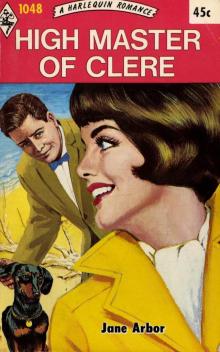 High Master of Clere
High Master of Clere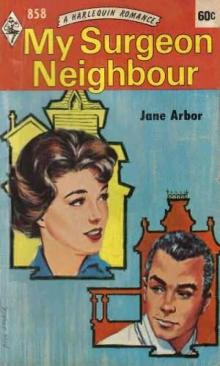 My Surgeon Neighbour
My Surgeon Neighbour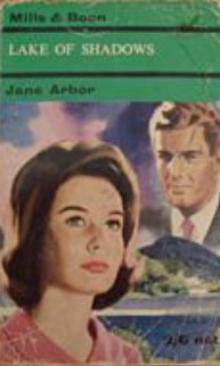 Lake of Shadows
Lake of Shadows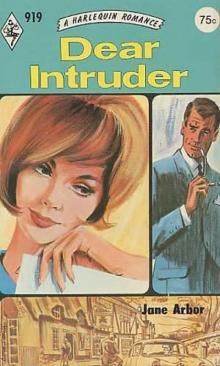 Dear Intruder
Dear Intruder Flash of Emerald
Flash of Emerald Return to Silbersee
Return to Silbersee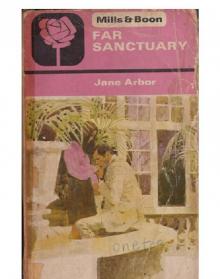 Far Sanctuary
Far Sanctuary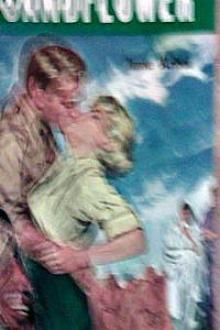 Sandflower
Sandflower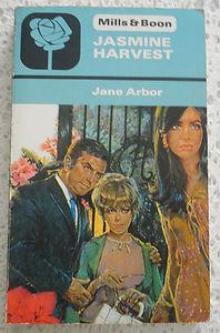 Jasmine Harvest
Jasmine Harvest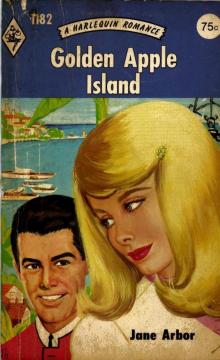 Golden Apple Island
Golden Apple Island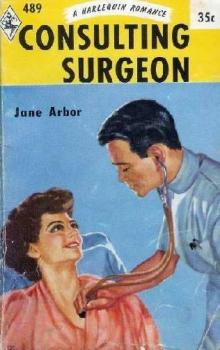 Consulting Surgeon
Consulting Surgeon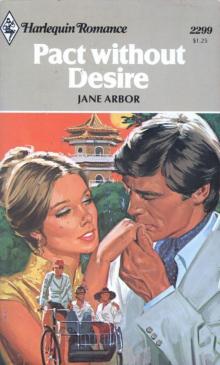 Pact without desire
Pact without desire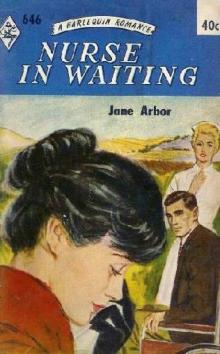 Nurse in Waiting
Nurse in Waiting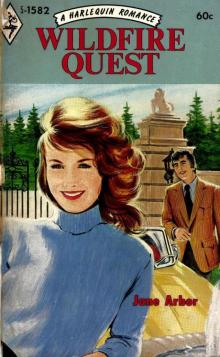 Wildfire Quest
Wildfire Quest Roman Summer
Roman Summer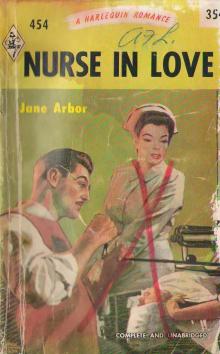 Nurse in Love
Nurse in Love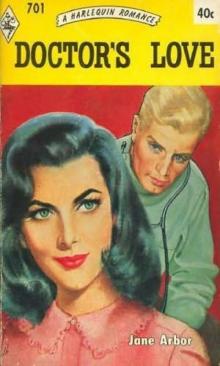 Doctor's Love
Doctor's Love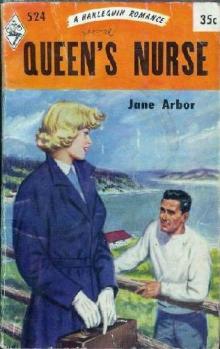 Queen's Nurse
Queen's Nurse Meet the Sun Halfway
Meet the Sun Halfway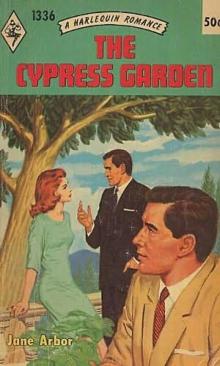 The Cypress Garden
The Cypress Garden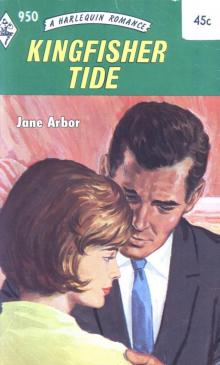 Kingfisher Tide
Kingfisher Tide A Growing Moon
A Growing Moon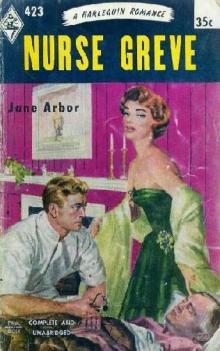 Nurse Greve
Nurse Greve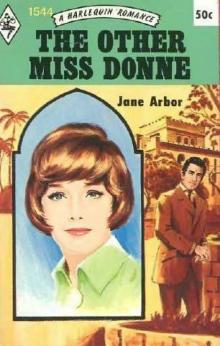 The Other Miss Donne
The Other Miss Donne